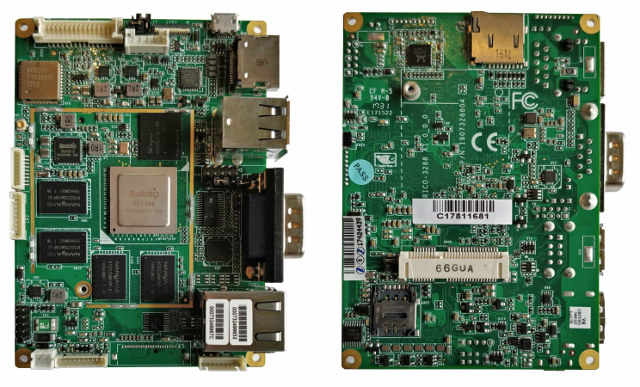Yesterday, as I published Linux 4.15 changelog for Arm and MIPS, I discovered a new Rockchip RK3288 platform described as “Amarula Vyasa single board computer”, so that got me interested. The full name of the company is “Amarula Electronics Limited Sony UK”, which means Vyasa is the name of the board.
Amarula Vyasa relies on a 2.5″ Pico-ITX form factor, and is available in either commercial and wide temperature (WiTAS) range. The board is equipped with 2GB RAM, 16GB eMMC flash, exposes ports and connectors such as HDMI 2.0, eDP, and LVDS, and plenty of network connectivity (WiFi, Ethernet, mPCIe modem…) that would make it suitable for a connected digital signage, or other applications requiring a (touchscreen) display and redundant Internet / network connectivity.

Amarula Vyasa specifications:
- SoC – CPU Rockchip RK3288 (ARM CortexTM -A17 Quad-core 1.6GHz)
- System Memory – 2GB DDR3L SDRAM
- Storage – 16GB eMMC flash, Micro SD card
- Video / Display I/F
- 1x HDMI 2.0 up to 1080p at 120 Hz
- 1x LVDS connector supporting RGB 18/24bit, dual channel; 3.3V/5V panel power
- 1x eDP connector up to 4Kx2K @ 30fps
- 1x MIPI Panel connector
- 1x Backlight connector; selectable 5V/12V
- Audio – 1x Audio Connector for 2.5W(by 4ohm) L/R Speaker and Line in (Microphone)
- Connectivity
- Gigabit Ethernet (RJ45)
- 802.11 a/b/g/n/ac WiFi
- Bluetooth 4.0 (BLE)
- GPS navigation
- NFC Function
- 1x mPCIe slot with Nano SIM slot
- USB – 2 x USB2.0 Type A port, 1x micro USB OTG port, 1x USB header with 3x USB 2.0
- Serial
- 1x RS232/422/485 D-SUB9 connector, pin9 with 5V or 12V power
- 1 x UART connector with 5V/12V power (TX, RX, CTS, RTS)
- Expansion
- GPIO header with 8x GPIO, 3.3V output, GND
- Full size mPCIe (USB) slot for 3G/4G modem
- Misc – 1x RTC battery connector
- Power Supply
- 12V DC power barrel jack
- 7.4V battery input connector
- RK808 PMIC
- Dimensions – 100mm x 72mm (Pico-ITX form factor)
- Weight – < 400 grams
- Temperature Range – Commercial: 0°C~60°C; WiTAS version: -20°C~70°C
- Relative Humidity – 5% ~ 90%R/H
- Certification – CE/FCC
There’s also mention of support for extended CAN BUS, extended PoE function and 2 extra RS232/433/485 ports.

The company provide documentation, an Android BSP, and explain how to use mainline Linux BSP (see progress status here) in order to generate a bootable Ubuntu 16.04 image in their Opendev website. Interestingly, yhe latter also includes instructions for boards not made by the company including Tinkerboard, some Allwinner boards (Orange Pi PC, NanoPi M1, etc..) , as well as i.MX6 systems-on-module made by Denx.
Amarula Vyasa pico-ITX board can be purchased for $150 for the commercial temperature version directly on the company website.

Jean-Luc started CNX Software in 2010 as a part-time endeavor, before quitting his job as a software engineering manager, and starting to write daily news, and reviews full time later in 2011.
Support CNX Software! Donate via cryptocurrencies, become a Patron on Patreon, or purchase goods on Amazon or Aliexpress





While the RK3288 has an excellent performance for the price, here we’re at the price of an equivalent Atom board, which would be much easier to install and maintain over time than any Rockchip solution. I don’t know if it will sell that much.
@cnxsoft: It’s openedev (not opendev) and Jagan who’s on the Amarula system’s payroll is one of the most active u-boot contributors which might explain random other boards showing up in the openedev wiki.
Hi
Jagan is working fully mainline in Amarula ;). Right now we have 3 projects on rockchip platform
I’d be more interested in an RK3399 for that price.
hmm, there’s one which looks very similar to this one
https://www.cnx-software.com/2018/01/26/aaeon-rico-3399-pico-itx-board-is-powered-by-rockchip-rk3399-op1-processor/
The board is on sale right now for £75.00.